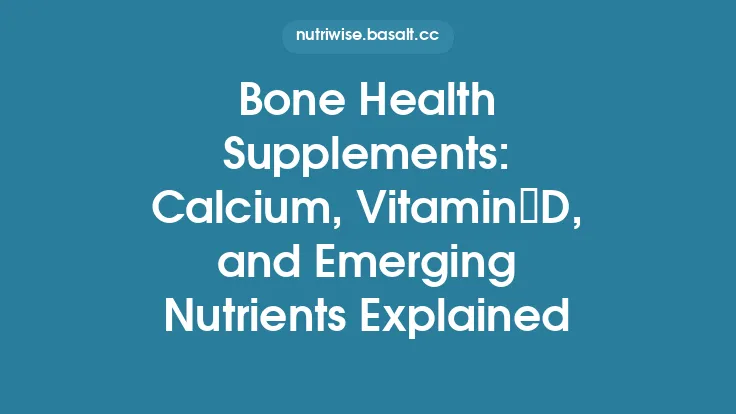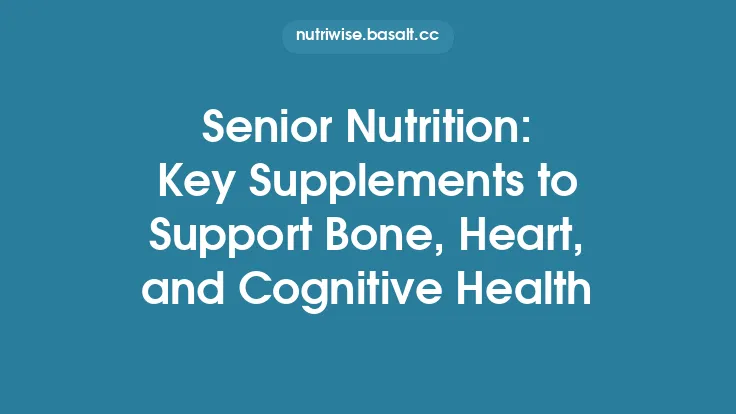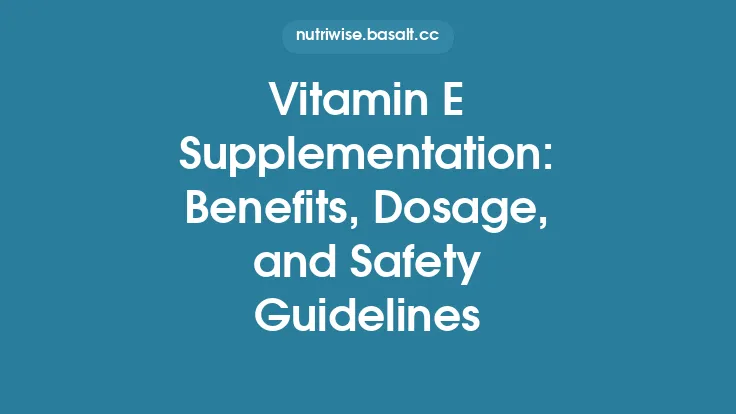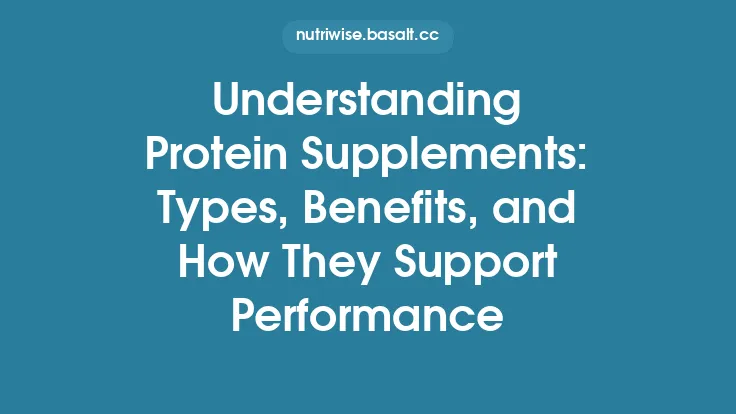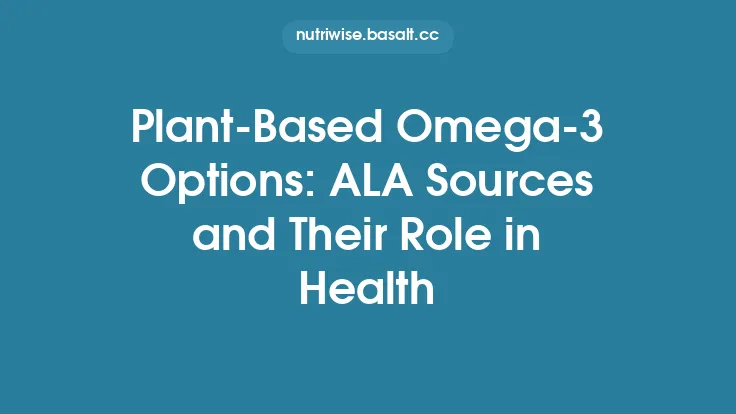Coenzyme Q10 (CoQ10) and plant sterols have emerged as two of the most studied nutraceuticals for supporting cardiovascular health. Both compounds are naturally occurring, yet modern diets and lifestyle factors can limit their availability in the body, prompting many individuals to turn to supplementation. This article explores the biochemical roles of CoQ10 and plant sterols, examines the scientific evidence linking them to heart‑health outcomes, and offers practical guidance on choosing high‑quality products and integrating them into a heart‑friendly regimen.
Understanding Coenzyme Q10 (CoQ10)
CoQ10, also known as ubiquinone, is a lipid‑soluble quinone that resides primarily within the inner mitochondrial membrane. It serves two critical functions:
- Electron Transport Chain (ETC) Participation – CoQ10 shuttles electrons between Complex I (NADH dehydrogenase) or Complex II (succinate dehydrogenase) and Complex III (cytochrome bc1). This transfer is essential for the generation of adenosine triphosphate (ATP), the cell’s primary energy currency.
- Antioxidant Defense – In its reduced form (ubiquinol), CoQ10 neutralizes reactive oxygen species (ROS) generated during oxidative phosphorylation. By preventing lipid peroxidation of cellular membranes, it protects endothelial cells and cardiomyocytes from oxidative injury.
The body synthesizes CoQ10 endogenously via the mevalonate pathway, the same route that produces cholesterol. However, synthesis declines with age, and certain medications (e.g., statins) can inhibit the pathway, leading to lower plasma and tissue levels.
Mechanisms Linking CoQ10 to Cardiovascular Benefits
| Mechanism | How It Impacts the Heart |
|---|---|
| Improved Myocardial Energy Production | Enhanced ATP availability supports contractile function, especially under stress (e.g., during exercise or ischemia). |
| Endothelial Protection | Antioxidant activity preserves nitric oxide (NO) bioavailability, promoting vasodilation and reducing arterial stiffness. |
| Anti‑Inflammatory Effects | CoQ10 modulates NF‑κB signaling, decreasing pro‑inflammatory cytokine release that contributes to atherogenesis. |
| Platelet Aggregation Modulation | By limiting oxidative modification of platelet membranes, CoQ10 can attenuate excessive clot formation. |
Collectively, these actions address several pathophysiological pillars of cardiovascular disease: energy deficiency, oxidative stress, inflammation, and thrombosis.
Clinical Evidence for CoQ10 in Heart Health
Heart Failure
Randomized controlled trials (RCTs) have consistently shown that adjunctive CoQ10 supplementation (30–300 mg/day) improves functional capacity and reduces major adverse cardiac events in patients with chronic heart failure. A landmark meta‑analysis of 12 RCTs (≈1,200 participants) reported a 13 % relative risk reduction in mortality and a modest increase in left‑ventricular ejection fraction (average +3.5 %).
Hypertension
Meta‑analytic data suggest that daily doses of 100–200 mg of CoQ10 can lower systolic blood pressure by 4–6 mm Hg and diastolic pressure by 2–4 mm Hg. The effect appears more pronounced in individuals with baseline systolic pressures >140 mm Hg, likely reflecting improved endothelial function.
Statin‑Associated Myopathy
Statins inhibit HMG‑CoA reductase, reducing both cholesterol and CoQ10 synthesis. Supplementation (100–200 mg/day) has been shown to alleviate muscle pain and weakness in up to 70 % of statin‑treated patients, potentially enhancing adherence to lipid‑lowering therapy.
Post‑Myocardial Infarction Recovery
Small RCTs indicate that CoQ10 may limit infarct size and improve post‑MI remodeling when administered early (within 48 h) at doses of 200 mg twice daily. Larger trials are ongoing to confirm these findings.
Plant Sterols: Structure, Sources, and Absorption
Plant sterols (phytosterols) are a family of structurally similar compounds to cholesterol, the most common being β‑sitosterol, campesterol, and stigmasterol. They are present in:
- Vegetable oils (e.g., corn, soybean, canola)
- Nuts and seeds
- Legumes
- Fortified foods (e.g., spreads, yogurts, dairy alternatives)
Because plant sterols share the sterol backbone with cholesterol, they compete for incorporation into mixed micelles in the intestinal lumen. This competition reduces the absorption of dietary and biliary cholesterol, leading to lower plasma low‑density lipoprotein (LDL) concentrations.
How Plant Sterols Influence Cardiovascular Risk
- LDL‑Cholesterol Lowering – Consuming 2 g of plant sterols daily typically reduces LDL‑C by 8–12 % without affecting high‑density lipoprotein (HDL) or triglycerides. The effect is dose‑dependent up to about 3 g/day, after which the incremental benefit plateaus.
- Improved Lipid Profile Stability – By attenuating post‑prandial cholesterol spikes, plant sterols contribute to a more stable lipid environment, which may reduce oxidative modification of LDL—a key step in atheroma formation.
- Endothelial Function – Some studies have reported modest improvements in flow‑mediated dilation (FMD) after 4–6 weeks of plant sterol supplementation, suggesting secondary benefits beyond LDL reduction.
Clinical Evidence Supporting Plant Sterols
- Meta‑analysis of 124 RCTs (≈30,000 participants): Demonstrated a mean LDL‑C reduction of 10 % with daily intake of 1.5–2.5 g of plant sterols. The effect was consistent across age groups, sexes, and baseline LDL levels.
- Long‑Term Outcomes: While direct evidence linking plant sterol intake to reduced cardiovascular events is limited, epidemiological modeling predicts a 5–10 % relative risk reduction in coronary heart disease for each 1 mmol/L (≈38 mg/dL) decrease in LDL‑C, aligning with the magnitude of change observed in trials.
- Safety Profile: Plant sterols are generally well tolerated. Rare cases of phytosterolemia (genetic disorder causing excessive sterol absorption) can lead to premature atherosclerosis, but this condition is exceedingly uncommon in the general population.
Choosing the Right Formulations
| Supplement | Typical Dosage | Key Considerations |
|---|---|---|
| CoQ10 (Ubiquinone/Ubiquinol) | 100–300 mg/day (divided doses) | Ubiquinol is the reduced, more bioavailable form; however, it is costlier. Look for oil‑based softgels or formulations with cyclodextrin complexes to enhance absorption. |
| Plant Sterols | 2 g/day (often as a spread or fortified product) | Ensure the product provides a minimum of 0.8 g per serving; avoid excessive intake (>3 g) as absorption plateaus and may interfere with fat‑soluble vitamin uptake. |
Integrating CoQ10 and Plant Sterols into a Heart‑Healthy Lifestyle
- Timing – CoQ10 is best taken with a meal containing fat to maximize absorption. Plant sterol‑enriched spreads can replace regular butter or margarine at breakfast and dinner.
- Synergy with Diet – A Mediterranean‑style diet rich in monounsaturated fats, nuts, and oily fish complements the mechanisms of both supplements, providing additional antioxidants (e.g., polyphenols) and omega‑3 fatty acids.
- Medication Interactions – CoQ10 may reduce the efficacy of warfarin (by influencing vitamin K metabolism) and should be monitored in patients on anticoagulants. Plant sterols can modestly lower the absorption of fat‑soluble vitamins (A, D, E, K); a multivitamin taken at a different time of day can mitigate this effect.
- Monitoring – Baseline lipid panels and, when appropriate, plasma CoQ10 levels can guide dosing. Re‑assessment after 8–12 weeks helps determine efficacy and need for adjustment.
Potential Limitations and Areas for Future Research
- Long‑Term Cardiovascular Outcomes – While surrogate markers (LDL‑C, blood pressure, ejection fraction) are robust, large-scale outcome trials (e.g., >5 years) are needed to confirm reductions in myocardial infarction, stroke, and mortality.
- Individual Variability – Genetic polymorphisms in the NPC1L1 transporter (involved in sterol absorption) and in the COQ2 gene (CoQ10 biosynthesis) may influence response. Personalized supplementation strategies could become a focus of nutrigenomics.
- Combination Therapies – Preliminary data suggest that co‑administration of CoQ10 with plant sterols may provide additive benefits on endothelial function, but rigorous trials are required to validate synergistic effects.
Practical Take‑Home Messages
- CoQ10 supports myocardial energy production, protects vascular endothelium from oxidative stress, and may improve outcomes in heart failure, hypertension, and statin‑related muscle symptoms. A daily dose of 100–200 mg of a well‑absorbed formulation is a reasonable starting point for most adults.
- Plant sterols are a proven, food‑based strategy to lower LDL‑C by 8–12 % when consumed at ~2 g per day. They are most effective when incorporated into daily meals (e.g., fortified spreads) and should be paired with a balanced diet to ensure adequate intake of fat‑soluble vitamins.
- Safety – Both supplements have excellent safety records when used at recommended doses. Monitoring is advisable for individuals on anticoagulant therapy or those with rare metabolic disorders.
- Holistic Approach – Supplements are adjuncts, not replacements, for lifestyle measures such as regular aerobic exercise, smoking cessation, weight management, and a heart‑healthy diet.
By understanding the biochemical foundations, reviewing the clinical evidence, and applying thoughtful dosing strategies, individuals can harness CoQ10 and plant sterols as part of a comprehensive plan to maintain and improve cardiovascular health.
